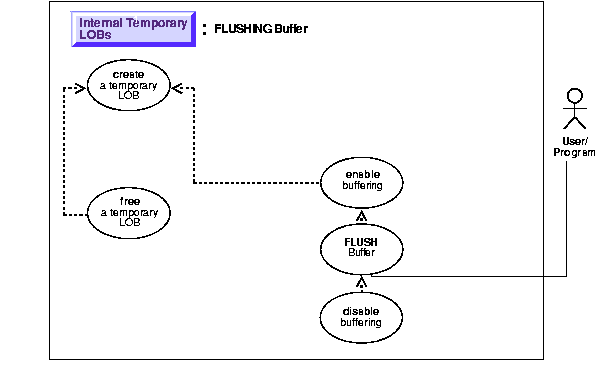Release 1 (9.0.1)
Part Number A88879-01
Home |
Book List |
Contents |
Index | Master Index | Feedback |
| Oracle9i Application Developer's Guide - Large Objects (LOBs) Release 1 (9.0.1) Part Number A88879-01 |
|
Temporary LOBs, 28 of 29

|
See:
"Use Case Model: Internal Temporary LOBs", for all basic operations of Internal Temporary LOBs. |
This procedure describes how to flush the buffer for a temporary LOB.
Not applicable.
See Chapter 3, "LOB Support in Different Programmatic Environments" for a list of available functions in each programmatic environment. Use the following syntax references for each programmatic environment:
Not applicable.
Examples are provided in the following programmatic environments:
sb4 lobBuffering (envhp, errhp, svchp, stmthp) OCIEnv *envhp; OCIError *errhp; OCISvcCtx *svchp; OCIStmt *stmthp; { OCILobLocator *tblob; ub4 amt; ub4 offset; sword retval; ub1 bufp[MAXBUFLEN]; ub4 buflen; /* Allocate the descriptor for the lob locator: */ (void) OCIDescriptorAlloc((dvoid *) envhp, (dvoid **) &tblob, (ub4)OCI_DTYPE_LOB, (size_t) 0, (dvoid **) 0); /* Select the BLOB: */ printf (" create a temporary Lob\n"); /* Create a temporary lob :*/ if(OCILobCreateTemporary(svchp, errhp, tblob, (ub2)0, SQLCS_IMPLICIT, OCI_TEMP_BLOB, OCI_ATTR_NOCACHE, OCI_DURATION_SESSION)) { (void) printf("FAILED: CreateTemporary() \n"); return -1; } /* Open the BLOB: */ if (OCILobOpen(svchp, errhp, (OCILobLocator *) tblob, OCI_LOB_READWRITE)) { printf( "OCILobOpen FAILED for temp lob \n"); return -1; } /* Enable LOB Buffering: */ printf (" enable LOB buffering\n"); checkerr (errhp, OCILobEnableBuffering(svchp, errhp, tblob)); printf (" write data to LOB\n"); /* Write data into the LOB: */ amt = sizeof(bufp); buflen = sizeof(bufp); offset = 1; checkerr (errhp, OCILobWrite (svchp, errhp, tblob, &amt, offset, bufp, buflen, OCI_ONE_PIECE, (dvoid *)0, (sb4 (*)(dvoid*,dvoid*,ub4*,ub1 *))0, 0, SQLCS_IMPLICIT)); /* Flush the buffer: */ printf(" flush the LOB buffers\n"); checkerr (errhp, OCILobFlushBuffer(svchp, errhp, tblob, (ub4)OCI_LOB_BUFFER_FREE)); /* Disable Buffering: */ printf (" disable LOB buffering\n"); checkerr (errhp, OCILobDisableBuffering(svchp, errhp, tblob)); /* Subsequent LOB WRITEs will not use the LOB Buffering Subsystem */ /* Closing the BLOB is mandatory if you have opened it: */ checkerr (errhp, OCILobClose(svchp, errhp, tblob)); /* Free the temporary lob now that we are done using it: */ if(OCILobFreeTemporary(svchp, errhp, tblob)) { printf("OCILobFreeTemporary FAILED \n"); return -1; } /* Free resources held by the locators: */ (void) OCIDescriptorFree((dvoid *) tblob, (ub4) OCI_DTYPE_LOB); return; }
This script is also located at $ORACLE_HOME/rdbms/demo/lobs/cobol/tflush
IDENTIFICATION DIVISION. PROGRAM-ID. FREE-TEMPORARY. ENVIRONMENT DIVISION. DATA DIVISION. WORKING-STORAGE SECTION. 01 USERID PIC X(11) VALUES "SAMP/SAMP". 01 TEMP-BLOB SQL-BLOB. 01 IS-TEMP PIC S9(9) COMP. 01 ORASLNRD PIC 9(4). EXEC SQL INCLUDE SQLCA END-EXEC. EXEC ORACLE OPTION (ORACA=YES) END-EXEC. EXEC SQL INCLUDE ORACA END-EXEC. PROCEDURE DIVISION. FREE-TEMPORARY. EXEC SQL WHENEVER SQLERROR DO PERFORM SQL-ERROR END-EXEC. EXEC SQL CONNECT :USERID END-EXEC. * Allocate and initialize the BLOB locators: EXEC SQL ALLOCATE :TEMP-BLOB END-EXEC. EXEC SQL LOB CREATE TEMPORARY :TEMP-BLOB END-EXEC. * Do something with the temporary LOB here: * Free the temporary LOB: EXEC SQL LOB FREE TEMPORARY :TEMP-BLOB END-EXEC. EXEC SQL FREE :TEMP-BLOB END-EXEC. STOP RUN. SQL-ERROR. EXEC SQL WHENEVER SQLERROR CONTINUE END-EXEC. MOVE ORASLNR TO ORASLNRD. DISPLAY " ". DISPLAY "ORACLE ERROR DETECTED ON LINE ", ORASLNRD, ":". DISPLAY " ". DISPLAY SQLERRMC. EXEC SQL ROLLBACK WORK RELEASE END-EXEC. STOP RUN.
This script is also located at $ORACLE_HOME/rdbms/demo/lobs/proc/tflush
#include <oci.h> #include <stdio.h> #include <sqlca.h> void Sample_Error() { EXEC SQL WHENEVER SQLERROR CONTINUE; printf("%.*s\n", sqlca.sqlerrm.sqlerrml, sqlca.sqlerrm.sqlerrmc); EXEC SQL ROLLBACK WORK RELEASE; exit(1); } #define BufferLength 1024 void flushBufferingTempLOB_proc() { OCIClobLocator *Temp_loc; varchar Buffer[BufferLength]; int Amount = BufferLength; int multiple, Length = 0, Position = 1; EXEC SQL WHENEVER SQLERROR DO Sample_Error(); /* Allocate and Create the Temporary LOB: */ EXEC SQL ALLOCATE :Temp_loc; EXEC SQL LOB CREATE TEMPORARY :Temp_loc; /* Enable use of the LOB Buffering Subsystem: */ EXEC SQL LOB ENABLE BUFFERING :Temp_loc; memset((void *)Buffer.arr, 42, BufferLength); Buffer.len = BufferLength; for (multiple = 0; multiple < 8; multiple++) { /* Write Data to the Temporary LOB: */ EXEC SQL LOB WRITE ONE :Amount FROM :Buffer INTO :Temp_loc AT :Position; Position += BufferLength; } /* Flush the contents of the buffers and Free their resources: */ EXEC SQL LOB FLUSH BUFFER :Temp_loc FREE; /* Turn off use of the LOB Buffering Subsystem: */ EXEC SQL LOB DISABLE BUFFERING :Temp_loc; EXEC SQL LOB DESCRIBE :Temp_loc GET LENGTH INTO :Length; printf("Wrote %d characters using the Buffering Subsystem\n", Length); /* Free the Temporary LOB */ EXEC SQL LOB FREE TEMPORARY :Temp_loc; /* Release resources held by the Locator: */ EXEC SQL FREE :Temp_loc; } void main() { char *samp = "samp/samp"; EXEC SQL CONNECT :samp; flushBufferingTempLOB_proc(); EXEC SQL ROLLBACK WORK RELEASE; }
|
|
 Copyright © 1996-2001, Oracle Corporation. All Rights Reserved. |
|